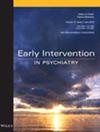The Role of Chronotypes and Perceived Stress on Sleep Quality in Undergraduates in Taiwan
Abstract
Introduction
Chronotypes and perceived stress can predict psychiatric symptoms and affect sleep quality, though the relationships between these factors are not completely described. This study explores the influence of chronotypes and perceived stress on sleep quality among undergraduates.
Methods
An online survey was administered to a convenience sample of 110 undergraduates aged 18–23 years (mean age 20.32 ± 1.00) at a university in southern Taiwan, predominantly women and senior students. Three self-reporting instruments were used: the Munich Chronotype Questionnaire, the Perceived Stress Scale, and the Pittsburgh Sleep Quality Index. Multivariate regression analysis was performed to investigate the influence of chronotype and perceived stress on sleep quality in undergraduates.
Results
Sixty-one per cent of the respondents were poor-quality sleepers. Moreover, 85.5% of the respondents were classified as “neither” chronotype, whereas 13.6% were “evening” chronotype. Sleep quality was associated with both chronotype and perceived stress level (r = 0.41, 0.43, p < 0.01). Multiple regression revealed higher MCTQ scores (continuous or categorical) and higher perceived stress were significantly associated with poorer sleep quality, explaining approximately 30% of the variance (p < 0.001).
Conclusions
The findings of this study showed evening-type undergraduates with higher perceived stress exhibited poorer sleep quality. Highlight the importance of considering chronotype in health promotion among individuals transitioning to adulthood. Early interventions may help align an individual's chronotype with their external time schedule, mitigate the negative impacts of misaligned later chronotypes, enhance sleep quality, and help to manage perceived stress levels in undergraduates.

 求助内容:
求助内容: 应助结果提醒方式:
应助结果提醒方式:


